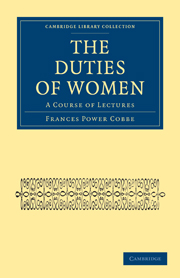LECTURE IV - SOCIAL DUTIES (continued)
Published online by Cambridge University Press: 05 July 2011
Summary
Passing from Duties arising from the ties of Blood-Relationship (Parents and Children, Sisters, Brothers and so on), we reach the exceedingly important class of Duties founded on Contract; pre-eminently on the great Contract of Marriage.
The formal Marriage Contract of most civilized nations includes two natural, and one artificial obligation.
First there is the mutual promise of Conjugal Union, to which is added a mutual engagement of exclusive Fidelity of each to each. This is strictly speaking the Marriage Vow; the one essential promise among monogamous races.
But the entrance into this bond brings the contracting parties so much more closely together than any other human connection, that it follows that they ought to afford primary Benevolence to one another, and seek each other's welfare before all others; reservation being made of the rights of those to whom they already owe debts not annullable by the new contract. Most properly and wisely then, a second promise,—to “honour and cherish” each other, in sickness and health, poverty and riches, is, almost universally, added to the original simple vow of Fidelity. The obligation is acknowledged and reinforced by the vow; but it arises independently from the nature of the relationship.
A third vow of the wife is added by the English Church, and by many other Churches—namely, the Vow of Conjugal Obedience. Of this I shall speak in its turn.
- Type
- Chapter
- Information
- The Duties of WomenA Course of Lectures, pp. 97 - 126Publisher: Cambridge University PressPrint publication year: 2010First published in: 1881

